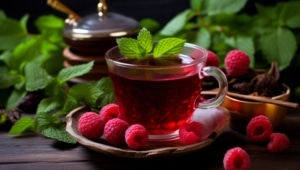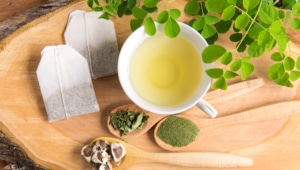10 Health Benefits of Turmeric Tea & 3 Risks
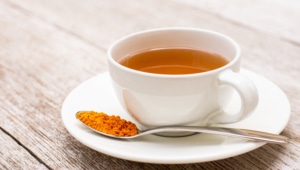
Turmeric tea is originally from India, and was brought to Europe via the Dutch East India Company in the early 1600s. Back then, South Indian turmeric was highly prized. Learn here everything you need to know about the health benefits of turmeric tea.
In ancient times, turmeric was used for all kinds of medicinal uses. It was revered in both traditional Chinese and Ayurvedic medicines. Today, turmeric still makes a valuable, golden tea.
Since ancient times, turmeric tea has been valued for use on swellings and sprains. Yet it also has so many other uses and beneficial effects on your body and mind.
From boosting immunity to helping with the treatment of cancer, turmeric tea is a true wonder. In this article we’ll explore the many benefits of this gold-colored tea, and how you can best enjoy it at home.
What Turmeric Tea Is: Interesting Facts
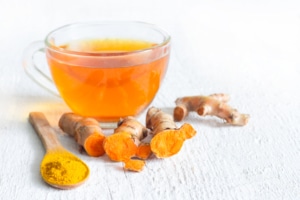
What Turmeric Tea Is: Interesting Facts
The turmeric plant is also known as curcuma longa, and is actually a member of the ginger family. All parts of the turmeric plant are edible, including its leaves and flowers.
Interestingly, only the root is used for making tea, the leaves and flowers aren’t. Turmeric milk tea or ‘golden milk’ is usually made with a powdered form of turmeric.
In ancient India, people thought that turmeric was filled with the energy of their Divine Mother. It was said to help bring prosperity and purify your chakras or focal energy points of your body.
Origin and Where Turmeric Tea Comes From

Origin and Where Turmeric Tea Comes From
Turmeric’s origins date back around 4000 years. It’s still mostly produced in Southern India to this day. In the USA, turmeric is mostly grown in Georgia by The American Turmeric Company.
What Turmeric Tea Is Made Of
Turmeric tea is made from either fresh or dried turmeric root. It’s steeped in boiled water and usually enjoyed while still hot. It’s fairly similar to ginger tea, though perhaps a little less spicy.
What Turmeric Tea Tastes Like
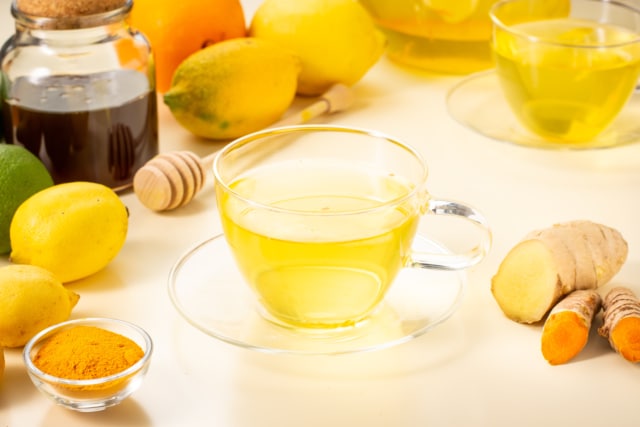
What Turmeric Tea Tastes Like
If you drink turmeric tea on its own, without any added spices or milk, it has an earthy, slightly spicy flavor. It’s a little like ginger, though perhaps a bit less spicy in your throat. You can balance the flavors by adding other ingredients.
Does Turmeric Tea Have Caffeine?
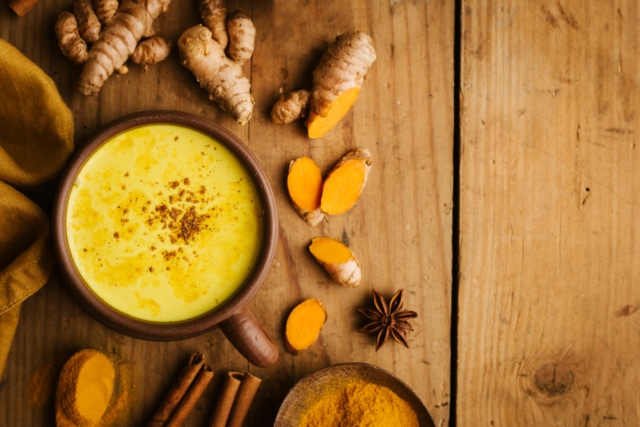
Does Turmeric Tea Have Caffeine?
Plain turmeric tea does not contain caffeine. It’s a great option for those who can’t tolerate caffeine well or who need to avoid it for medical reasons. With that said, the curcumin in turmeric has been found to boost your energy levels naturally.
Nutritional Facts and Calories of Turmeric Tea

Nutritional Facts and Calories of Turmeric Tea
Turmeric is a rich source of many different nutrients, including vitamin B6, vitamin C, manganese, iron. It’s full of antioxidants, flavonoids, and amino acids, and an excellent source of phytonutrients.
By far its most helpful antioxidant and phytonutrient, however, is curcumin. This compound is a carotenoid that occurs naturally in turmeric’s roots and is the reason it has its bright yellow color.
Turmeric tea contains between 10 to 30 calories per cup, depending on the way you brew it and how much you use. This is without the addition of any milk or sweeteners.
Health Benefits of Drinking Turmeric Tea
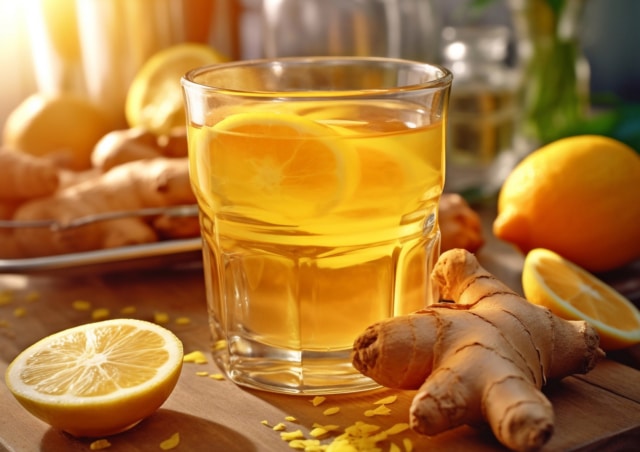
Health Benefits of Drinking Turmeric Tea
Turmeric tea is full of vitamins, minerals, and other beneficial nutrients. It’s one of the healthiest teas you can add to your diet, and will offer you a huge range of benefits for both body and mind. Below are the most common benefits you’ll gain from regularly enjoying turmeric tea.
Helps Reduce Symptoms of Arthritis and Joint Aches

Helps Reduce Symptoms of Arthritis and Joint Aches
The high curcumin content of turmeric is one of the main reasons it may be helpful for improving rheumatoid arthritis symptoms.
Turmeric has antioxidant and anti-inflammatory properties, both of which are helpful for reducing inflammation and joint pains.
Studies have actually shown antioxidants to be good at stimulating the growth of new cartilage cells protecting your joints.
Boosts Your Immune System

Boosts Your Immune System
Turmeric tea may boost your immune system, thanks to phytonutrients that fight free radicals in your body.
Phytonutrients help protect your cells, boost antioxidants in your body, and thereby help improve your immunity. They can also help prevent the mutation of cells — a valuable benefit when it comes to fighting cancer.
May Help Treat and Prevent Certain Cancers
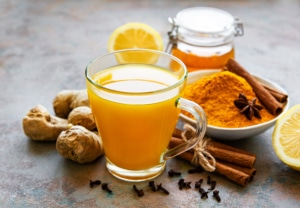
May Help Treat and Prevent Certain Cancers
Studies have shown that adding turmeric to your diet can actively slow down the growth and spread of cancer cells. The reason for this is, again, the curcumin in turmeric.
Curcumin is still being looked into in clinical trials to see how much it may help cancer patients in the future.
If you’re currently fighting cancer, adding turmeric tea to your diet may well be a great complementary treatment besides more standard medicines.
Could be Beneficial in Treating and Preventing Alzheimer’s Disease

Could be Beneficial in Treating and Preventing Alzheimer’s Disease
Animal studies have been conducted on the effects of turmeric on Alzheimer’s disease. One of turmeric’s key components, turmerone, has been proven to stimulate your body to create new brain cells.
Theoretically this should make turmeric tea a helpful natural remedy for those suffering from Alzheimer’s or dementia.
Might Reduce and Prevent Heart Problems

Might Reduce and Prevent Heart Problems
Curcumin present in turmeric tea has been shown to protect against heart disease. It helps increase the antioxidant levels in your body as well as reducing inflammation.
Both of these have been shown to be helpful in preventing heart disease and helping your overall heart health.
Some studies appear to suggest that turmeric may even help improve the outcomes for those suffering from coronary heart disease.
Could Help in the Management of IBS

Could Help in the Management of IBS
Turmeric tea may help relieve symptoms of IBS, or irritable bowel syndrome. One study showed that people who took turmeric had less irregularities in their bowel movements and pain. This was reported when taking turmeric supplements, though tea should have a similar, if milder, effect.
Helps Manage Symptoms of Diabetes

Helps Manage Symptoms of Diabetes
The curcumin content of turmeric tea is, yet again, helpful when it comes to managing diabetes symptoms. Curcumin may reduce your blood sugar levels, prevent unwanted weight gain, and increase your sensitivity to insulin.
However, it is suggested that you speak to your doctor first if you’re diabetic and thinking of adding turmeric tea or a supplement to your diet.
May Have a Beneficial Effect on Certain Lung Conditions

May Have a Beneficial Effect on Certain Lung Conditions
Turmeric tea, and particularly its high curcumin content, may also be beneficial when it comes to chronic lung conditions, asthma, lung injuries, and more.
This is largely due to its anti-inflammatory and antioxidant properties, both of which may be helpful when it comes to supporting the proper functioning of your lungs.
Turmeric is also said to be a natural antiseptic, making it helpful when it comes to fighting coughs, colds, and even bronchitis.
Might Aid in Weight Loss
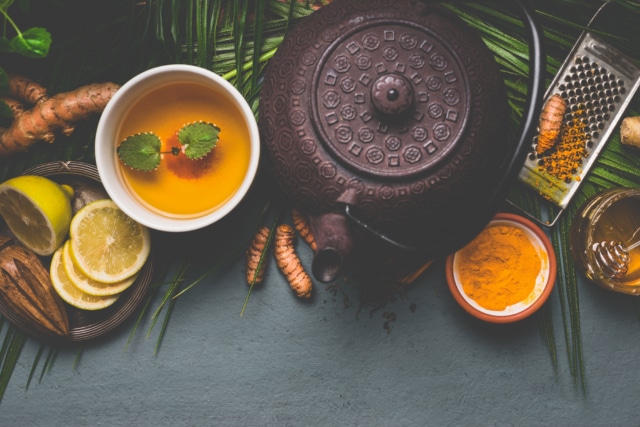
Might Aid in Weight Loss
Adding turmeric tea to your diet may be helpful at supporting weight loss. Make sure you follow an exercise plan and healthy diet that suits you and your body.
Then add turmeric tea to help boost your metabolism. Turmeric, much like ginger, may help you burn fat faster, so it’s a helpful addition to any weight loss diet.
Could Improve Mood and Help Against Depression

Could Improve Mood and Help Against Depression
Turmeric tea may help ease symptoms of low mood and depression. This is again due to the curcumin content, which can ease inflammation, and modify the release of dopamine and serotonin in your body.
This, alongside turmeric tea’s ability to improve your memory and help your body create new brain cells may well be helpful for improving your mental health.
Benefits of Turmeric Tea with Ginger

Benefits of Turmeric Tea with Ginger
Ginger and turmeric are both in the same family of plants, so many of the benefits are similar. Adding ginger to your turmeric tea makes it more spicy and warming.
Ginger is frequently used to reduce nausea, treat colds and fevers, help reduce inflammation in the body, and more.
Pairing the two makes for a helpful drink for a variety of ailments. You can even make our recipe for golden milk (below) and add ginger for a wonderful, healthy drink.
Potential Risks
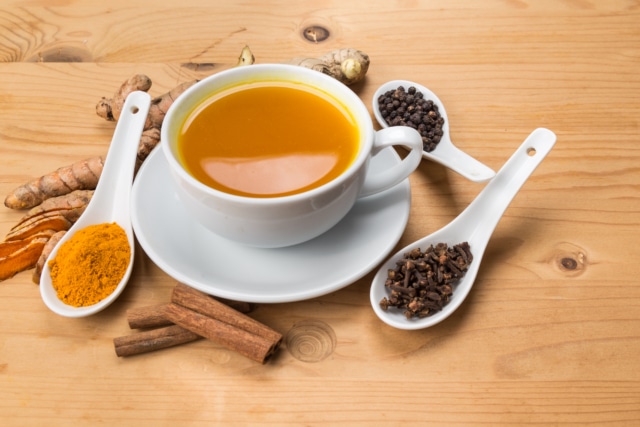
Potential Risks
As with any natural remedy, turmeric tea also poses a few risks. Most of these have to do with overconsumption — having far too much turmeric tea.
However, it’s always worth knowing of any potential side effects before adding anything new to your diet. Here are the best known ones.
Too Much Could Cause Stomach Upset and Ulcers
Having too much turmeric repeatedly over a long period of time could cause an upset stomach and even ulcers. With that said, this is generally considered a risk for turmeric or curcumin supplements. You’d have to have a vast amount of turmeric tea to experience any of these problems.
May be Detrimental for those with Gallstones and Liver Problems

May be Detrimental for those with Gallstones and Liver Problems
If you have gallstones, an obstruction of the bile duct, or liver problems, you may wish to steer clear of turmeric. Turmeric is said to make gallbladder issues worse and can apparently, in extreme cases, cause liver injury.
On the other hand, some claim that it may help detoxify the liver, so this may again be a case of using the right amounts for your condition. If in doubt, speak to your doctor to see whether or not turmeric tea might be helpful for you.
Turmeric Tea Could Increase Bleeding in People Who Take Blood Thinners
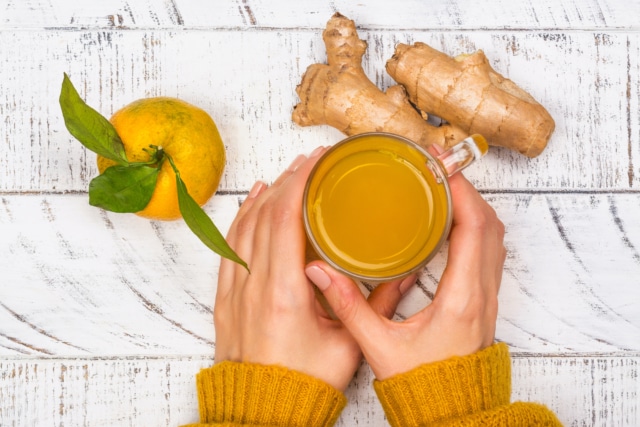
Could Increase Bleeding in People Who Take Blood Thinners
Turmeric could interfere with how well your blood clots, effectively increasing the risk of bleeding. If you’re on blood thinners, you may wish to avoid taking turmeric.
If in doubt, or if you wish to try it for one of the health benefits above, speak to your doctor to make sure turmeric tea is right for you.
Is Turmeric Tea in Pregnancy Good For You?

Is Turmeric Tea in Pregnancy Good For You?
Turmeric tea is considered safe in pregnancy, so long as you limit the amounts you consume to food quantities. However, you probably shouldn’t take turmeric in supplement form or consume medicinal quantities when pregnant.
Some say that high doses of turmeric could potentially harm an unborn baby or could stimulate your uterus.
There hasn’t been any evidence to suggest that normal food doses of turmeric or turmeric tea are unsafe or that the tea can cause problems in pregnancy.
With that said, any potential risks or effects are essentially not known. You may wish to proceed with some caution or speak to your doctor before adding turmeric tea to your diet.
Other sources claim that turmeric milk is helpful in pregnancy, and can even be helpful if you suffer from gestational diabetes. Every pregnancy and woman is different, so speaking to an expert to find out what suits you is always advisable.
Simple Guide for Making the Perfect Turmeric Tea
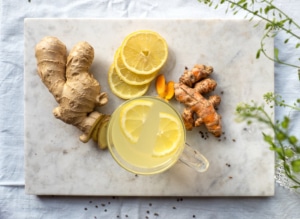
Simple Guide for Making the Perfect Turmeric Tea
Turmeric tea on its own is beneficial, but by far the most widely known and used turmeric drink is ‘Golden Milk.’
This authentic turmeric milk tea is chock full of the many health benefits we’ve mentioned above. Follow our easy recipe to make the perfect turmeric milk tea.
Ingredients:
- 2 cups of your favorite milk (dairy milk or plant-based)
- 1 tsp of ground turmeric
- ¼ tsp of ground cinnamon
- a pinch of black pepper
- a pinch of cardamom
- 1 tbsp of honey
And here’s how you do it:
- Add the milk to a pot and gently bring to a simmer.
- Add in all of the spices and the honey, and stir until blended. Simmer for about 10 minutes. This is your golden milk.
- Pour the golden into two cups and enjoy.
Tips for Drinking and Serving Turmeric Tea
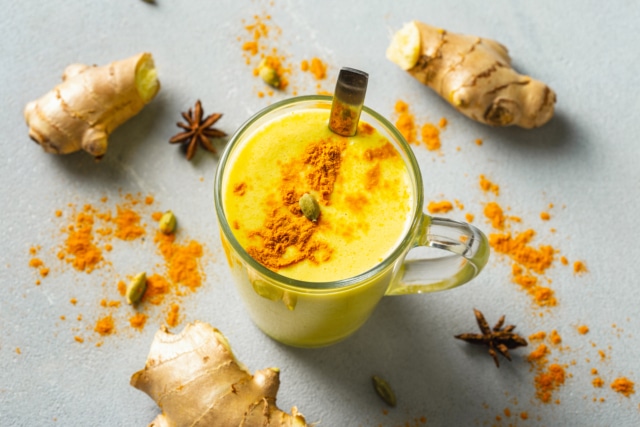
Tips for Drinking and Serving Turmeric Tea
Turmeric tea tastes earthy, savory, and a little spicy on its own. It’s a delicious tea, but it is unusual and not everyone loves it without added flavorings.
Below are some of our favorite tips for drinking and serving turmeric tea — with all the added health benefits, and even tastier flavors.
Combine Turmeric with Ginger, Cinnamon, and Honey

Combine Turmeric with Ginger, Cinnamon, and Honey
Turmeric tea combines very well with ginger, cinnamon, and honey. Ginger adds more anti-inflammatory qualities, helps fight a variety of ailments, and may soothe colds and fevers.
Cinnamon contains antioxidants, helps keep your gut healthy, and lowers blood pressure amongst other health benefits.
Honey is a powerhouse of antioxidant, anti-inflammatory, antibacterial properties, and more. Together these make for a warming, spicy drink that’s ideal for colder days. Add in some dairy milk or plant-based milk.
Make a Delicious Turmeric and Green Tea Smoothie

Make a Delicious Turmeric and Green Tea Smoothie
If hot beverages aren’t your thing, you can reap the benefits of turmeric tea in the shape of a healthy smoothie.
Simply mix some matcha powder, turmeric powder (or strong turmeric tea), banana, avocado, spinach, almond milk, honey or maple syrup, and ice. Blend to your desired consistency and enjoy.
- Chai Tea. Health Benefits and Hacks.
- Raspberry Leaf Tea. Tips, Hacks and Health Benefits.
- Starbucks Refresher. Tips and Best Drinks.
- Jelly Belly Flavors. Best and Grossest.
- Boba Flavors. Best Flavors and Types.
- Pop Tart Flavors. Tasty Alternatives and Best Flavors.
- Cinnamon Tea. Health Benefits and Tips.

